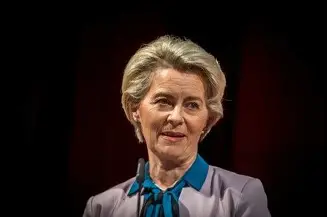European Commission president Ursula von der Leyen has urged the suspension of free trade with Israel, citing Europe’s “painful” inability to respond effectively to the war in Gaza and the resulting humanitarian crisis.
In her most forceful criticism yet of the Israeli government, von der Leyen condemned plans for illegal settlements that would divide the occupied West Bank, as well as inflammatory rhetoric from extremist Israeli ministers, describing them as a “clear attempt to undermine the two-state solution”.
Delivering her annual state of the union address to the European Parliament in Strasbourg, she portrayed a world in which “battle lines are being drawn” and “dependencies are ruthlessly weaponised”. She also expressed solidarity with Poland following reported Russian violations of its airspace, calling for increased pressure on President Vladimir Putin to enter negotiations.
Von der Leyen announced that the European Commission would freeze bilateral support for Israel, except for funding to civil society organisations and the Yad Vashem Holocaust memorial. She said proposals would be tabled to suspend the trade provisions of the EU-Israel association agreement and to impose sanctions on extremist Israeli ministers and violent settlers in the West Bank.
The EU is Israel’s largest trading partner, with annual trade worth €68bn (£59bn). While 32% of Israel’s global goods trade is with the EU, the country accounts for only 0.8% of EU goods trade. The 2000 EU-Israel association agreement established a free-trade area and cooperation in research, environmental and energy policy.
It remains uncertain whether the EU will secure the majority needed to suspend trade, with even less ambitious measures, such as freezing Israel’s participation in EU research programmes, currently blocked.
Von der Leyen also reiterated her call to end unanimity in EU foreign policy decision-making, describing it as “the shackles of unanimity”. She pledged to maintain the EU’s climate agenda, announced a strategy to eradicate poverty in Europe by 2050, and expressed interest in adopting aspects of Australia’s restrictions on children’s social media use.
Her speech drew mixed reactions. Socialist leader Iratxe García Pérez welcomed the steps on Israel but criticised them as “too little, too late” and attacked the EU’s trade deal with US president Donald Trump. Green co-leader Terry Reintke said von der Leyen’s proposals represented “modest change” that must be implemented. The far-right Patriots group also condemned the US trade deal.
Von der Leyen defended the agreement, arguing it prevented a damaging trade war and provided stability in EU-US relations. She also called for tougher sanctions on Russia, faster moves to end reliance on Russian fossil fuels, and measures to use frozen Russian assets to support Ukraine’s war effort.



